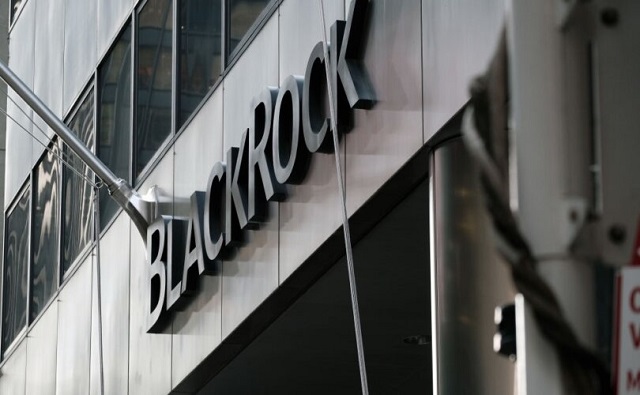Business
‘A Huge Win’: Woke Climate Cartel Goes Belly Up


From the Daily Caller News Foundation
By Owen Klinsky
The Net Zero Asset Managers (NZAM) coalition — a United Nations–sponsored collection of financial services companies that have pledged to negate their portfolio’s greenhouse gas emissions by 2050 or sooner — suspended activities after investment firm BlackRock announced its departure from the group, according to a press release.
BlackRock, which manages more than $10 trillion and has been a leader in environmental, social and governance (ESG) investing, announced its exit from NZAM Thursday, with its Vice-Chair Philipp Hildebrand saying the firm’s involvement in the environmental coalition “caused confusion regarding BlackRock’s practices and subjected us to legal inquiries from various public officials.” Now, NZAM has pressed pause altogether, halting operations while it conducts a review of its activities, an NZAM press release published Monday said.
JUST IN: The UN-backed Net Zero Asset Managers (NZAM) group has announced that it will be shutting down completely, following @BlackRock‘s departure. pic.twitter.com/o5htgvFEiH
— Will Hild (@WillHild) January 13, 2025
A slew of other financial services had left NZAM prior to BlackRock’s Thursday exit, including Goldman Sachs Group, Wells Fargo & Co., Citigroup, Bank of America, Morgan Stanley and JPMorgan Chase & Co. BlackRock’s exit came amid a broader corporate strategy shift away from ESG investing, with the firm only supporting about 4% of the 493 environmental and social investment proposals that shareholders put forward between the end of June 2023 and the end of June 2024, down from a rate of 47% in 2021.
BlackRock was a major supporter of ESG investing in years prior, with CEO Larry Fink saying in 2020 that “climate risk is investment risk” and that climate change would lead to a “fundamental reallocation of capital.”
“The destruction of NZAM is a huge win for consumers,” Will Hild, executive director of the conservative nonprofit Consumers’ Research, told the Daily Caller News Foundation. “Although there is a lot of work left to be done, what was effectively a cartel of asset managers has finally ceased taking the focus of businesses off of consumers, raising prices for everyday Americans everywhere from the gas pump to the grocery store.”
When reached for comment, NZAM referred the Daily Caller News Foundation to its press release.
Alberta
Made in Alberta! Province makes it easier to support local products with Buy Local program

Show your Alberta side. Buy Local. |
When the going gets tough, Albertans stick together. That’s why Alberta’s government is launching a new campaign to benefit hard-working Albertans.
Global uncertainty is threatening the livelihoods of hard-working Alberta farmers, ranchers, processors and their families. The ‘Buy Local’ campaign, recently launched by Alberta’s government, encourages consumers to eat, drink and buy local to show our unified support for the province’s agriculture and food industry.
The government’s ‘Buy Local’ campaign encourages consumers to buy products from Alberta’s hard-working farmers, ranchers and food processors that produce safe, nutritious food for Albertans, Canadians and the world.
“It’s time to let these hard-working Albertans know we have their back. Now, more than ever, we need to shop local and buy made-in-Alberta products. The next time you are grocery shopping or go out for dinner or a drink with your friends or family, support local to demonstrate your Alberta pride. We are pleased tariffs don’t impact the ag industry right now and will keep advocating for our ag industry.”
Alberta’s government supports consumer choice. We are providing tools to help folks easily identify Alberta- and Canadian-made foods and products. Choosing local products keeps Albertans’ hard-earned dollars in our province. Whether it is farm-fresh vegetables, potatoes, honey, craft beer, frozen food or our world-renowned beef, Alberta has an abundance of fresh foods produced right on our doorstep.
Quick facts
- This summer, Albertans can support local at more than 150 farmers’ markets across the province and meet the folks who make, bake and grow our food.
- In March 2023, the Alberta government launched the ‘Made in Alberta’ voluntary food and beverage labelling program to support local agriculture and food sectors.
- Through direct connections with processors, the program has created the momentum to continue expanding consumer awareness about the ‘Made in Alberta’ label to help shoppers quickly identify foods and beverages produced in our province.
- Made in Alberta product catalogue website
Related information
2025 Federal Election
The “Hardhat Vote” Has Embraced Pierre Poilievre

 David Krayden
David Krayden
Blue collar and unionized workers are supporting Pierre Poilievre and the CPC
When President Richard Nixon won a landslide in his 1972 reelection, he did so by broadening his own personal popularity and the appeal of the Republican Party to blue collar and unionized workers. It was called the hardhat vote and many working people embraced Nixon because he seemed to be talking the same language as they were. Nixon talked about law and order and getting tough on crime; safer streets and harsher penalties for serious crime. Although unionized workers had traditionally voted for the Democratic Party and seen the Republicans as the party of the wealthy, by 1972 the Democrats had moved far to the left on social issues and were completely out of touch with average Americans who saw Democratic presidential nominee Sen. George McGovern as being soft on crime and approving of the anarchy on the streets.
It’s precisely the language that Conservative Party of Canada leader Pierre Poilievere is speaking in the 2025 federal election. As support for the New Democratic Party has collapsed throughout the election campaign, don’t think most of it is going to the Liberal Party. Poilievre has been targeting blue collar workers for years with his emphasis on the trades and talking about middle class tax cuts and safe streets. A factory or construction worker is middle class and just want an affordable lifestyle for their families. They don’t have a lot of time for the woke underbelly of the Liberals or the NDP and are increasingly reluctant to support either party because both have appealed to elites.
Listen to Karl Lovett, the president of the Local 773 of the International Brotherhood of Electrical Workers, talk about Carney corruption and why he is supporting Poilievre and the CPC in 2025.
“Mark Carney also failed to pay $5 billion in Canadian taxes by hiding his company’s assets in Bermuda above a bike shop. Hard to believe that information comes from Canada’s NDP, or at least who is left of them, because the irony is, Mark Carney has eaten all those people alive. Even the mayor of Lima has warned Canadians not to vote for Mark Carney, and why for ripping him off the poorest of the poor people in Peru. That’s who he ripped off,” Lovett said.
“Listen, there are countless other outrageous examples proving that Mark Carney doesn’t give a damn about the Canadian working man. And now, as prime minister, which he’s not, Carney is promising to put carbon tax and tariff on the auto industry. It’s another rip-off screen that’s right. We’re getting punched by Trump on one side of the border, and Carney plans to punch us on this side of the border, also pretending it’s all about climate change, and now he’s made millions off the workers’ backs. He wants more than money. He wants more power. He wants all of the power to do whatever he wants to do. Mark Carney cannot be trusted with this power. Mark Carney cannot be trusted to protect workers,” Lovett continued.
The union leader told a cheering crowd that “Mark Carney is in it for himself, and when he loses this election, you can bet Mark Carney is going to leave Canada in a New York minute. But there’s hope, there’s hope, there’s our last hope. His name is Pierre Poilievere – the .only hope for Canadian workers. You see Mark Carney fooled Justin Trudeau. We can’t let him keep fooling us.”
“Local 773, which I represent, knows Pierre Poilievre very well. We can proudly tell you that Pierre has our back. Pierre has been putting Canadian people to work and Canadian workers. First, local 773 began working with Pierre Poilievre, the Conservative Member of Parliament Chris Lewis, some years ago, when it became all too clear that the Liberal Party had zero interest in helping out workers. Upon winning the leadership of the party, Pierre made Local 773 his very first priority, he came to my union hall. Pier made the Local 773 Visitor Training Center, and he met all our workers, and he made a pledge to me; he’s not going to turn his back on us, and I believe him,” Lovett said.
Toronto Sun columnist Joe Warmington agreed with me and you can hear that entire interview, below. “Labor wants to work, and they want to, you know, build things, and they want those good, paying jobs, and that’s what Poilievre has always been about, you know.”
“He wants more power. He wants all of the power to do whatever he wants to do. Mark Carney cannot be trusted with this power. Mark Carney cannot be trusted to protect workers,”
“Again, it’s hard to know, but I always felt … and I still think that Poilievre is going to pull this off because of these reasons that you’ve raised today, I never really bought into and again, I’m just one person’s opinion, and I go on the ground. In the air, the polls are saying, I know there’s this main street poll today, maybe it’ll swing differently. But in the air, it says one thing, and on the ground, it says another thing. And that clip you just showed, that’s the ground, that’s where the workers are, that’s where the families are.”
-

 Alberta7 hours ago
Alberta7 hours agoProvince to expand services provided by Alberta Sheriffs: New policing option for municipalities
-

 Bruce Dowbiggin2 hours ago
Bruce Dowbiggin2 hours agoIs HNIC Ready For The Winnipeg Jets To Be Canada’s Heroes?
-

 2025 Federal Election4 hours ago
2025 Federal Election4 hours agoCSIS Warned Beijing Would Brand Conservatives as Trumpian. Now Carney’s Campaign Is Doing It.
-

 2025 Federal Election6 hours ago
2025 Federal Election6 hours agoNo Matter The Winner – My Canada Is Gone
-

 Alberta5 hours ago
Alberta5 hours agoMade in Alberta! Province makes it easier to support local products with Buy Local program
-

 Health3 hours ago
Health3 hours agoHorrific and Deadly Effects of Antidepressants
-

 2025 Federal Election2 days ago
2025 Federal Election2 days agoPoilievre will cancel Mark Carney’s new Liberal packaging law and scrap the Liberal plastic ban!
-

 Business2 days ago
Business2 days agoTed Cruz, Jim Jordan Ramp Up Pressure On Google Parent Company To Deal With ‘Censorship’







